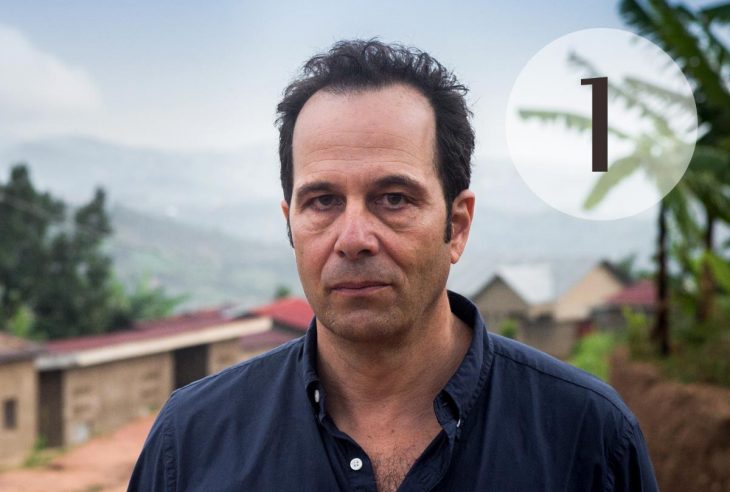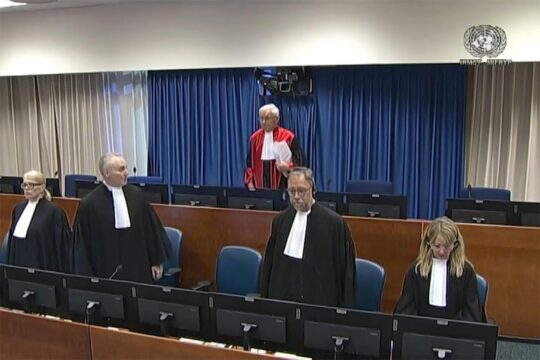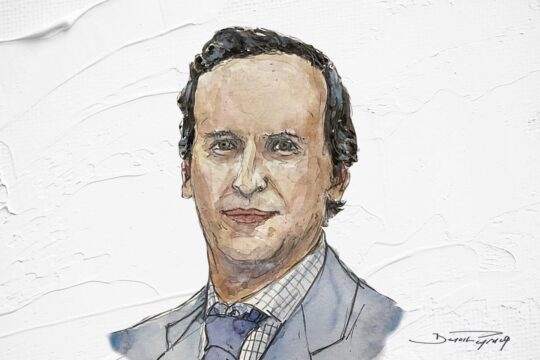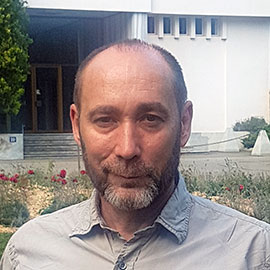JUSTICEINFO.NET IN-DEPTH INTERVIEWS
Philip Gourevitch
Journalist at The New Yorker and author
For the first time Rwandans can look at being in Rwanda in the aftermath of the genocide with the genocide somewhat behind them, says journalist and writer Philip Gourevitch. How has coexistence on the hills evolved over the past 25 years? What has been the impact of gacaca justice? What does reconciliation and forgiveness mean after mass murder? These are some of the themes Philip Gourevitch discusses in this first part of an interview with JusticeInfo.net.
1 – THE LIFE AFTER
JUSTICEINFO.NET: You wrote extensively on the aftermath of the genocide that took place in Rwanda between April and July 1994. Then came the first trials, followed by a mass-scale, extraordinary justice process of community-based courts called gacaca, and an official policy of accountability and reconciliation. 25 years after the genocide of Rwanda’s Tutsis, we now seem to be in the aftermath of the aftermath. How much of the past still invades the present?
PHILIP GOUREVITCH: We are in a period that I sometimes call the après-gacaca. Gacaca formally ended in 2012 after ten years. In the minds of many of the communities that went through it, it took a little while to feel that it was not the immediate past. But let’s say that, starting then, you went for the first time into a period in which there are still formal structures and attitudes and patterns for describing, discussing, and confronting the past, but there isn’t a program that everybody in the country is confronting each other in.
Until the end of gacaca, the genocide was literally still before them. They were going to have to “face” it. And a lot of the tensions that it created in post-genocide society were overlaid heavily with questions of legal culpability or accountability.
In a sense it’s the first time where people could just look at being in Rwanda in the aftermath of the genocide with the genocide somewhat behind them. So that’s a big change.
Now, sometimes people say strange things. I had a killer who said to me: “It felt very good after I got out of prison from gacaca” – he had killed a lot of people – “because now I was finished with this business of 1994.” And I thought: not so fast, monsieur! That was too easy: you pay a few fines but you still killed thirty people… And the survivors are not done. They are still brutally racked and are still reckoning with something else, which is that gacaca, in its complexity, made many trade-offs. Just for one, the motto of the gacaca courts was: truth heals. And the fact is, of course, that the truth also wounds.
Then you go to gacaca and that person decides to confess and gives you a blow by blow description of how they killed these persons.
When I interviewed people in the late 1990’s, they might say: I know that so and so killed most of my family – everybody knows in the community. Then you go to gacaca and that person decides to confess and gives you a blow by blow description of how they killed these persons. Suddenly you have this extreme violence re-enacted and reiterated. And, you know, even those survivors who saw extreme violence, by the nature of their survival, most of them were not physically present at the killing of their family members. And so, somebody suddenly tells you: “I brutally murdered your mother, I came down the hill, I found her here, I took a club, we smashed her, dragged her over here and threw her in the toilet. Then we went over and there were two little kids…”
And this is when you are asked to forgive the person.
And this is when you are asked to forgive the person. It’s totally re-traumatizing. At that point, you may be ready to say: look, I know this person did it and I am grateful that they are not denying it anymore. But that extra layer of truth took a lot of time to digest.
Since late 1996, you have been going back to the same commune of Taba, in the center of the country, talking to the same people, victims and killers, living side by side, at times some were even under the same roof. In 2009, you wrote that “Rwanda is the only nation where hundreds of thousands of people who took part in mass murder live intermingled at every level of society with the families of their victims.” Ten years on, how do they live with it, and how do they live with each other?
Aspects of it remind me of individual grief. When somebody unexpectedly loses a dear family member and they’re truly devastated and it’s all consuming, ten years on, if you meet them, it’s unlikely they would bring it up. If it was a murder and you bring it up, they might sort of say: we’ve dealt with that.
Now you hear people who come to Rwanda and say: people never talk about the past. As if an unwillingness to talk to a foreigner you’ve met for the first time and who asks you about the most traumatic personal, political and societal wounds, necessarily means that you are avoiding it. I find, in fact, that they do talk about it. It’s there. Some talk about it quite a bit. But even then, of course, everyone has a limit before they have to pull back and say – well, so – and that always strikes me as sane and healthy, not some kind of fear and silence.
Of course it’s different for perpetrators and survivors. For perpetrators, the word that is often used instead of trauma is shame. Shame is what has to be managed, after the guilt is. It’s an obstacle between you and others. Just like the guilt is.
When you see people who are living together, seemingly all right, does that mean they have really dealt with it or does that mean they haven’t?
There are plenty of social divisions and social tensions in Rwanda, and some of them map directly onto the genocide, but many of them don’t. So the question in a way – and this is the eternal, unanswerable question that I have been wrestling with there – is: when you see people who are living together, seemingly all right, does that mean they have really dealt with it or does that mean they haven’t?
And you can’t tell.
You can’t tell. Not in a generalized way. You can tell sometimes, by talking to someone a lot, and by going back to them periodically. But then they say there are things they have dealt with, and others they haven’t dealt with. And that changes, too, with time: dealt with things can become undealt with again and vice versa.
The fact that a lot of the energy in Rwanda’s reconstruction has been in public health and economic development, that the circumstances are improving, means people see a purpose in pressing on, they see a reward. And it is more egalitarian on a Hutu/Tutsi level. This is not to say that there isn’t a Tutsi elite, and complicated social strata, including by the way a lot of prosperous and influential Hutus. But for instance among the people I visit in Taba, in the extended household of one of the large Hutu families, the generation that was in its thirties and forties in 1994 all took part in the genocide and went to prison, and none of them had ever been to college. Their children go to college – some of them, even with mother or father in prison for genocide. One of the killers told me, “before the genocide for 'petits Hutus' like us, that was unthinkable”. If the kids do well on the test, they have a chance. If they go to the clinic, there’s decent health care. This isn’t to say that Rwanda is a paradise by any means or that there aren't lots of resentments. It means that social experience today, social possibility, is not simply based in gacaca, or in dealing with one's genocide inheritance, and that makes them feel that some things have changed towards to make things less unfair.
2 – THE PRAGMATISM OF RECONCILIATION
A survivor in Taba, Evariste, told you ten years ago: “All this reconciliation and the confessions—that’s the program of the state. And when a killer comes and asks your pardon you can’t do anything else. You pardon him, but you don’t really know if it comes from your heart, because you don’t really know about the killer—if he is asking forgiveness from his heart.” And you wrote: “Still, Evariste believed that it was better to fake it than not.” What is the meaning of reconciliation after genocide?
I was very skeptical. It seemed impossible. Look at the country I come from: the civil war has felt quite unreconciled in the last few years. That was a hundred and fifty years ago, and there’s nobody with a living memory, and this is a country where you might say that the South and the North are fairly integrated and reconciled – and yet all these fault lines are there, in our politics, in our society, in our minds and our hearts.
Twenty, never mind twenty-five years ago, the odds that Rwandans would be where they are now within my lifetime seemed very hard to imagine.
Twenty, never mind twenty-five years ago, the odds that Rwandans would be where they are now within my lifetime seemed very hard to imagine. People say: you’re just painting a rosy picture and saying they’re all reconciled. That is the last thing I'd ever say.
Evariste is the brother-in-law of a killer. The killer was married to his sister, so a Tutsi. In 2009, when I saw Evariste, he said he was very happy as long as the guy was in prison. But now the guy has just come out of prison. Suddenly he is back! Evariste was scared of him still. Then he realized that he is no longer that scary. A big thing to remember here is that unlike killers in normal times who when they get out of prison everyone says uh-oh when will he do it again, the genocidaires did not kill simply of their own impulse when it was prohibited, but only when it was licensed by the state. Some killed afterward to eliminate witnesses who could incriminate them. But it took everyone there a while to realize – oh after trial or prison we don't have to fear them unless they were to retake power. So Evariste said, fine OK, I pardon you, but he wanted nothing more to do with the guy. When I wrote that story that was the truth about where they were at.
Later I went back, many times, and at one point somebody told me: those two now get along, they go and drink together at the market. I asked Evariste: Really? you’re drinking with your brother in law? He said yeah. I said: Wait a minute, what about what you told me in 2009? He said: Yes, that was true in 2009.
This is the après-gacaca that I was talking about. What happened in gacaca did not only happen in gacaca. It happened later. Evariste watched his brother-in-law for a few years; he sees his sister is in a better place than she’s ever been; that this guy is no longer the bully of the home and the hill; he is now a cautious guy who tries to help his wife out in the household; he is treating his kids all right; he is not hanging out with the other génocidaires; and he’s come back repeatedly asking for forgiveness. So Evariste accepted him. Other survivors told me: “Well, that’s the brother-in-law, he has family relations, he’s got to deal with it – not me, no way.”
Is reconciliation an exercise in pragmatism?
It’s conceived that way—it demands a kind of pragmatic civility. When you say it’s a policy of the government, that sounds like saying it is the official story, as if to say immediately that it’s false.
That’s how the victims seemed to be feeling about it in your 2009 piece...
They did, but that also gave them some protection, from themselves. When they said, we're only doing this because the state requires it, they didn't say it was wrong – but that they were not reconciled inside themselves to the reconciliation they were enacting on the outside. They didn't physically resist, but their hearts and minds were resistant – they struggled with it. Look, we have taboos on racial slurs in our culture, right? What was normal for many people to say fifty years ago, now at the very least they better say it privately if that’s what they still believe, like: I have no choice, it’s the government’s policy, I can’t be a racist anymore. At first, people say it’s “PC” [politically correct], it’s social control, it’s not freedom, it's fake, a masquerade – it’s being suppressed therefore it will come back only stronger. But in fact many people, within a decade of adhering to the taboo, if they heard somebody using the racist word, would have flinched and been offended. Their attitude has changed, their feelings have changed, as a result of policy – and not just their language, which is the outward enactment, but the inner feelings that go with that language.
People live so locally. This is Taba, and they don’t care about Akayesu. They care about the guy next door who’s still there. That’s how they experienced it.
So there are aspects of this policy that Rwandans accepted and came to appreciate even while they resented its imposition. And this is another interesting thing: people live so locally. This is Taba, and they don’t care about Akayesu [the former mayor of Taba, sentenced to life imprisonment by the International Criminal Tribunal for Rwanda in 1998]. He rarely comes up. They care about the guy next door who’s still there. That’s how they experienced it.
Even in 2015/2016, you would ask people about how they dealt with the gacaca and its aftermath, and they would often say: “For me, I can’t stand seeing this guy, it causes me pain every day, it’s the government policy, but in general, in the overall community, things are much better.” I started to notice people say: “Me, I’ve still got plenty to complain about, I am still unsettled, but the society as a whole is moving in a much better direction.” So I thought that’s an interesting perception, especially the fact that it seems consistent. It means you’re saying: that killer of my family, or that victim of my family, I can’t deal with him; but somebody who may be the killer or victim of somebody else whom I don’t know, if I encounter him without having that framework, I can deal with it. But I couldn’t in 1994. I couldn’t in 2005. So what was a social-political crisis moves toward being a private personal wound to manage, which is still intense, but as a pattern in this post-genocide dynamic that seems to me on the whole preferable to things moving the other way.
Does it mean reconciliation plays out at different levels and changes over time?
Yes, and naturally the government keeps saying it’s a success, because that’s what governments have to do. At one point I talked to Domitille Mutankaganzwa [former Executive Secretary of the National Service of Gacaca Jurisdictions] who was in charge of the whole gacaca court system, and she said: once we get through gacaca we can start having reconciliation. Officially the whole program she was in charge of was supposed to be an instrument of reconciliation. But realistically she understood that what it meant was that it was an instrument laying a groundwork.
Today people can talk to each other about the past, not only in an accusatory or confessional form directly, but in much more social and reconciliatory terms.
Today people can talk to each other about the past, not only in an accusatory or confessional form directly, but in much more social and reconciliatory terms. They’re dealing with things at a different level than they were fifteen years ago.
3 – THE STRUGGLE OF FORGIVENESS
Another major theme that transpires from your writing is forgiveness.
It’s inescapable.
In 2009, another survivor, an old lady you had met and interviewed over many years, said: “Forgiveness came from a Presidential order.” She said that Paul Kagame, the president of Rwanda, was “the one who pardoned them.”
A lot of survivors said to me that the formula in gacaca was basically that you’re asking forgiveness from the state, first.
So what is asking for forgiveness or granting it in post-genocide Rwanda? How do Rwandans make sense of it?
It’s been the hardest question for me. It stumped me for years, and I don’t think I'll ever get it entirely. I go back sometimes just to try and understand that a little more – what they think it means to forgive, or to be forgiven for, such offenses. And it’s not like all Rwandans understand it the same way. Of course, they have very different ideas about it.
I don’t know if pardon carries quite the same meaning in French – literally, to give or give up for, a trade-off, and if you ask for what, well, the opposite of forgiving is punishing. And certainly the concept of forgiveness is often entangled with religion. There is much more religious writing about forgiveness than there is secular or legal writing, and either way, the literature really doesn't address certain topics that in Rwanda are routine, like: forgiving your neighbor who was your lifelong friend until the day he hacked your mother and children to bits, and walked home wearing your flip-flops.
You don't have to trust someone to forgive them, restoring trust is an entirely separate question from forgiveness.
What was being asked Rwandans was so extreme. And one thing that took me a while to realize is that they have a very modest idea of what forgiveness means. To me the idea of forgiveness, especially when it was talked about in connection to reconciliation, always sounded like it meant going back to some kind of relationship like the status quo before. But Rwandans say, no no, that requires trust – you don't have to trust someone to forgive them, restoring trust is an entirely separate question from forgiveness. OK, so what does forgiveness require? Pretty much everyone I asked in Rwanda told me the same thing: The most fundamental basis of forgiveness is an internal decision, by the forgiver, to forego revenge – literally to let go of the idea of getting even. I called this modest, a sort of bare minimum, but think about the scale and scope of the offenses and injuries we're talking about, and what it would mean for Rwandans not to forgive, and you see it's no small thing.
This still leaves many questions: Should you and can you forgive somebody if they don’t ask for forgiveness? Doesn’t penitence have to come first? What does it mean to forgive somebody who doesn’t ask for it? How can you forgive someone for killing someone else – let's say your mother? Can you do that without betraying her?
All this was at play in Rwanda.
There was the formal, or semi-legal, state-driven version of it. And then there’s the individual reckoning, which took longer and was a real struggle. In other words, when Evariste says that it’s better to fake it than to be in conflict, I think the premise that many Rwandans shared and kept going back to when they were angry with these programs and felt they were being pushed to hard, was: the alternative is unacceptable.
Rwandans often say: we have no choice. And this makes them sound both oppressed and fatalistic.
Rwandans often say: we have no choice. And this makes them sound both oppressed and fatalistic. I talked to some people who worked on reconciliation policy in the Rwandan establishment who said: Yes, that means we have been too heavy-handed, we shoved it down their throat too much, because they should feel that it is their choice. And so this is their way of asserting themselves, by saying: “We have no choice.”
But really, what does "no choice" mean? It means: we know what the alternative to coexistence is, and that’s not an option.
But really, what does "no choice" mean? It means: we know what the alternative to coexistence is, and that’s not an option. So now we’re stuck with this situation.
And then, slowly, that can lead – in different rhythms and relationships and different people – to ways to find their way back into accepting one another more freely.
One thing that people said to me a lot around that time in 2009 was that it feels terrible to everybody. The killers didn’t like to see the survivors, the survivors didn’t like to see the killers. But I kept hearing the same thing: it’s better if we say hello when we pass each other than if we go to the other side of the street, because then we’re in conflict, we fear each other, we are suspicious and we’re still enemies. We don't have to be friends, but if we're not a threat then other things can, maybe, happen.
Look, all of this is very unfamiliar to me – such extremity in such proximity – and I have to say that it has taken me a long time to accept or believe that these relationships aren’t essentially so false psychologically – so against the human grain – that they can’t be real. As opposed to the idea that they are fragile, manufactured, dependent on a lot of complicated political, social pressures and balancing acts, but also can acquire reality over time.
4 – TALKING THE NATION THROUGH WAR AND GENOCIDE
There is a lot of literature on the power of talking about the violence that took place. Rwandans were asked to have an incredible conversation about the crimes committed within their communities, over a very long period of time – about twenty years. Was it liberating for them to talk, or have they just exhausted themselves talking about it?
That's not necessarily a bad thing – to exhaust it. Like in any relationship when you have a genuine conflict, you either talk about it until you talk yourselves into a new heat, and talk yourselves apart, or until you say this is as far as we’re going to get, it’s good enough, and you leave it alone. Is that liberating? Compared to where you started out, yes, but saying "good enough" hardly feels that way at the time.
Rwandans often complain – not surprisingly – about all that is unsaid. You hear it also from outside commentators, that there is all this non dit, unspoken silences and taboos. And I don’t know. I mean, Holocaust survivors didn’t speak about the Holocaust even in their own families for the first twenty years. Here, they talked about it a lot.
In a culture where it is said that hiding thoughts and emotions is a cultural value…
In most places people bury it totally, and separate physically. And here they haven’t. Of course it has required the heavy hand of the state. In most cases, it also takes that to bury it.
I don’t believe that. I think that Rwandans have been told that to the point that they believe it. I sometimes ask people there who say that: What do you think other people do in the rest of the world? That everybody’s running around being incredibly, brutally honest? That in other places that have had devastating communal violence they’re all having touchy-feely encounter groups all day long? And taking each other home for meals? No! In most places people bury it totally, and separate physically. And here they haven’t. Of course it has required the heavy hand of the state. In most cases, it also takes that to bury it.
It has meant that certain things are talked about less than others. For instance, the war. The genocide happened in the middle of a decade of civil war. The war in Rwanda didn’t just last from October 1990 to the genocide, it resumed almost immediately and continued until about 2000-2001 in the Northwest, when you finally had the entire national territory under a single military control again without any internal armed challenge.
When you and I first met in Rwanda, in 1995, people spoke of the war and the genocide. Of course perpetrators tended to speak of the war and not the genocide as if the genocide was only a feature of the war, which was a way of denying it. But most people spoke about both. Their experience of the war years were not eclipsed by the genocide.
That war memory is very little spoken about now. The genocide is, of course, the defining experience, and the history surrounding it is intensely contested and charged, but I think it would be healthy if there was more of a way for Rwandans to talk about that whole larger history more complexly. Some people says it’s completely taboo, or it’s totally covered up. I have not found that to be so. If I bring it up, it’s not difficult to talk to people about it. A lot comes out. But there is no public discourse about it. Some people say that’s because the RPF [Rwandan Patriotic Front, the rebel movement that took power in July 1994] committed atrocities during that war and afterwards, and that they don't want to answer for them. No doubt that is a factor. But interestingly, for what it’s worth, there has been no such reckoning with Hutu Power’s atrocities and massacres in the war period before or after the genocide, either. And quite a number of Hutu political and military figures who were very much anti-RPF, and more broadly anti-Tutsi, have been not just been reintegrated into society, but into government and the Army. Some pretty senior people even. As long as there are not inescapable genocide accusations against them from 1994, the attitude is: let it go – if we want peace, we have to make it with our enemies.
Do you see this missing part of the conversation – the fact that Hutus could not speak about crimes committed by the RPF during that period – as a time bomb, or an impediment to the stability of Rwanda in the future?
I think a lot of people do recognize that there was a war, that there was a genocide, that the genocide did not justify all the horrors of the war and the killings that may have occurred in the course of the war, but that it didn’t happen outside that context.
I don’t know. I don’t see it as an inevitable time bomb. And I am not sure that if there are time bombs that’s the big one. Because I think a lot of people do recognize that there was a war, that there was a genocide, that the genocide did not justify all the horrors of the war and the killings that may have occurred in the course of the war, but that it didn’t happen outside that context.
One thing to remember is that Rwandans' experience of the RPF from 1990 to 1994 was, like everything else in Rwanda, very local. That war was overwhelmingly in the North, and until 1993 there weren't even the massive displacements from the war zone that gave the war a broader physical presence. But even then there were large parts of the country – the South, the Southwest – that the war never touched directly, and where there was no war-time experience of the RPF. The fact of the war, combined with the political crisis of 1990-94 was a national trauma, but for most of the country, through most of that time, the war had no physical presence.
The genocide, on the other hand, consumed the whole country.
Then, after 1994 there were, broadly speaking, two wars that had two theatres: there was Congo, and there was the Northwest of Rwanda. Again, much of the country was very aware of it, on edge and polarized because of it, but not actually feeling the brunt of RPF combat. And though the fighting in the northwest ripped through communities, it did not for the most part involve communal violence, in the sense of neighbors having at neighbors. That doesn’t make it less deadly, less of an offense, less of a crime in some cases. A lot of civilians were killed by both sides. But the fighting was done by combatants. And that makes it easier to think of it as “the war” in contrast to the genocide. It depersonalizes it in ways that can be very explosive, for sure, but it's a different experience, and that matters perhaps even more when it comes to resuming life in the aftermath.
I don’t know, for instance, to what extent people who experienced RPF violence in their communities identify it with particular individuals. It’s hard to know for the obvious reason that if they do they might think it's best not to talk about it. But I've talked about that period with a number of the FDLR guys [Forces démocratiques de libération du Rwanda, an armed group created in the Congo by Hutu refugees and former génocidaires], who’ve been reintegrated. Many of them fought the RPF in the northwest in those years, and they don't seem afraid to talk about it, although they're not always big on naming names. Most of them don’t seem to think – at least they don’t say it to me – that this history is so volatile in those communities, a time-bomb as you say.
I have asked people in the RPF and the government: why don’t you guys get ahead of this issue and put up some war memorials that are separate from genocide memorials, and say, at least: there was a war here that caused all Rwandans great pain? Their answer is: “There can be no equivalence.” They mean between the war and the genocide. So I ask: Are you saying you can't address the war in a way that doesn't invite that equivalence? And if so why is that? Basically the answer I'd get was: “Well, because the forces against us are like that – they will exploit it that way.”
It’s a weakness when you have to make certain forms of expression taboo. And they’re like: 'Yeah! This is a weak society! We’re strong, but look what happened here – we're dealing with a weak fabric.'
Obviously, they perceive the issue as a threat, or a weakness – even though they look, and like to tell you, they're very strong. It’s like with some questions of free speech. I say: it’s a weakness when you have to make certain forms of expression taboo. And they’re like: “Yeah! This is a weak society! We’re strong, but look what happened here – we're dealing with a weak fabric.”
So, I make no predictions.
Interviewed by Thierry Cruvellier.
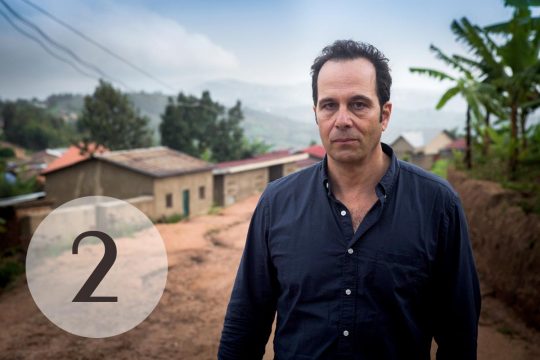
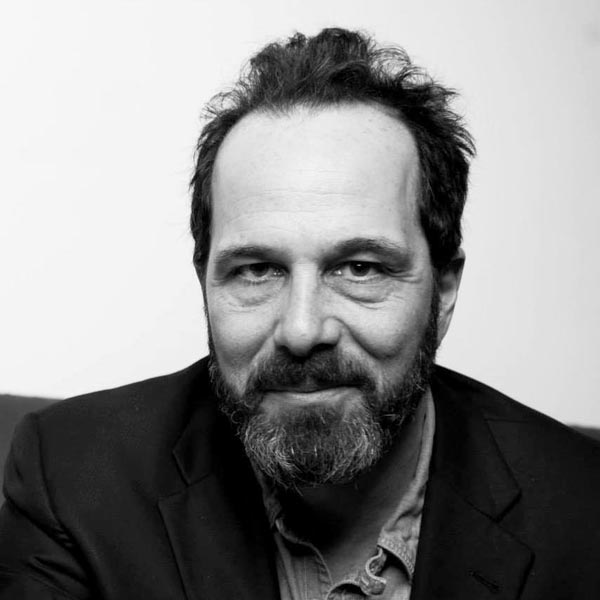
PHILIP GOUREVITCH
Philip Gourevitch is a longtime staff writer at The New Yorker, and the author of We Wish To Inform You That Tomorrow We Will Be Killed With Our Families, stories from Rwanda (1998). He reads it aloud on a new audiobook which will be released on April 9. He also wrote A Cold Case (2001), and The Ballad of Abu Ghraib: Standard Operating Procedure (2008). Over the past decade he has been revisiting Rwanda periodically for a new book, You Hide That You Hate Me And I Hide That I Know.


